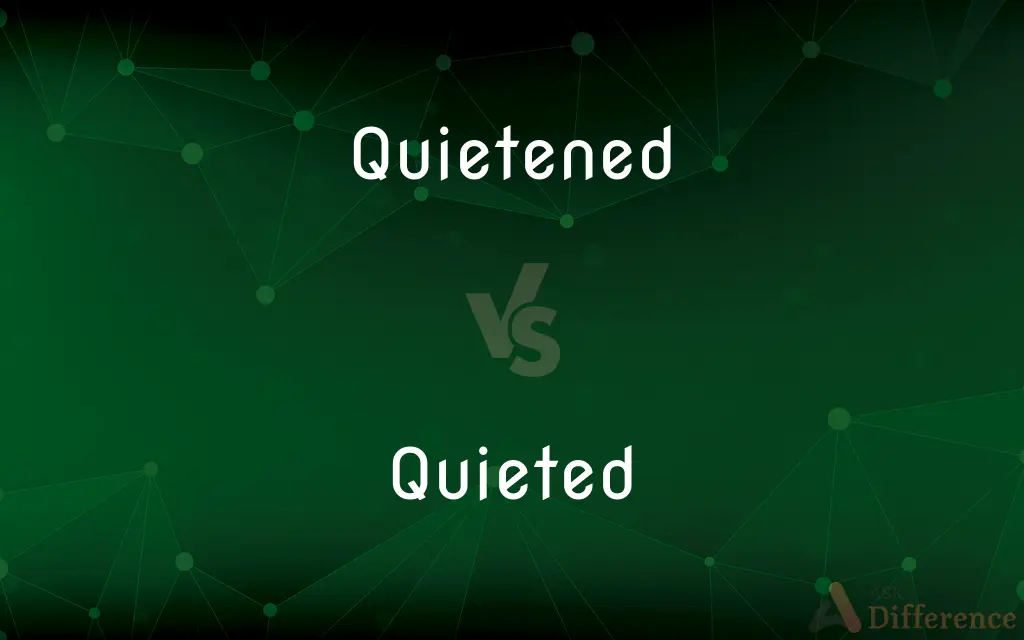Quietened vs. Quieted — What's the Difference?
By Fiza Rafique & Urooj Arif — Updated on April 16, 2024
Quietened and quieted both describe the act of making something less noisy, but quietened often suggests a gradual process, while quieted can imply a more immediate effect.

Difference Between Quietened and Quieted
Table of Contents
ADVERTISEMENT
Key Differences
Quietened often implies a gradual reduction in noise or intensity, used especially in British English. Whereas, quieted typically suggests an immediate or abrupt reduction in sound, common in American English.
In literature, quietened is sometimes used to convey a gentle or subtle decrease in activity or emotion. On the other hand, quieted is often employed to describe a decisive action to silence noise or disturbance.
When discussing emotional states, quietened can indicate a slow calming of feelings or thoughts. While, quieted might be used to denote quickly bringing someone’s emotions under control.
In terms of usage, quietened appears more frequently in contexts that emphasize a process occurring over time. Whereas, quieted is more often associated with specific incidents where noise is stopped promptly.
In the passive voice, both terms are used to describe something being made less noisy by an external force, but quietened might evoke a more continuous state of becoming quiet. In contrast, quieted could be perceived as reaching a state of quiet more directly and possibly temporarily.
ADVERTISEMENT
Comparison Chart
Connotation
Gradual process
Immediate effect
Common Usage
More frequent in British English
Predominantly American English
Emotional Context
Slow calming of emotions
Quick control of emotions
Literary Use
Gentle decrease in activity
Decisive action to silence
Implication in Passive Voice
Ongoing process of becoming quiet
Direct attainment of quietness
Compare with Definitions
Quietened
Reduced in intensity over time.
The winds quietened by the evening.
Quieted
Hushed or subdued abruptly.
The crowd was quieted by the loudspeaker announcement.
Quietened
Caused to become less active.
The market quietened after the holiday season.
Quieted
Pacified or made peaceful instantly.
The baby was quieted with a toy.
Quietened
Made less noisy or calm gradually.
The classroom quietened as the teacher spoke softly.
Quieted
Made silent or still immediately.
The alarm was quieted at once.
Quietened
Brought to a softer tone.
The music quietened to a whisper.
Quieted
Caused to stop making noise quickly.
She quieted the noisy engine.
Quietened
Diminished in emotional expression.
His anger quietened after her apology.
Quieted
Stilled or calmed down directly.
His fears were quieted by the reassuring news.
Quietened
To make or become quiet.
Quieted
Making or characterized by little or no noise
A quiet library.
A quiet street.
A quiet, well tuned engine.
Quietened
Simple past tense and past participle of quieten
Quieted
Free of turmoil and agitation; calm
A quiet lake.
A quiet place in the country.
Quieted
Providing or allowing relaxation; restful; soothing
A quiet afternoon nap.
A quiet tune on the flute.
Quieted
Not showy or bright; subdued
A room decorated in quiet colors.
Quieted
Restrained, as in style; understated
A quiet strength.
A quiet life.
Quieted
Out of public scrutiny; known or discussed by few
Wanted to keep the incident quiet until after the election.
Quieted
The quality or condition of being quiet
"A menacing quiet fills the empty streets" (Time).
Quieted
To cause to become quiet
The teacher quieted the students.
Quieted
To make (a title) secure by freeing from uncertainties or adverse claims as to the ownership.
Quieted
To become quiet
The child wouldn't quiet down for me.
Quieted
Simple past tense and past participle of quiet
Common Curiosities
What does it mean to be quieted?
It refers to being made silent or still immediately.
How does the emotional context differ between quietened and quieted?
Quietened suggests a gradual calming, whereas quieted suggests immediate control.
Can both terms be used in a passive voice?
Yes, both can be used passively but imply different intensities and durations.
In what context would you use quietened in a sentence?
In contexts emphasizing a gradual decrease in noise or activity.
What does it mean to be quietened?
It means to be made less noisy or calm gradually.
How do quietened and quieted differ in literary use?
Quietened is used for a gentle decrease, while quieted for more decisive actions.
Is quietened used differently in British and American English?
Yes, it is more common in British English.
Are quietened and quieted interchangeable?
They can be in some contexts, but not all due to their nuances in duration and immediacy.
Can quietened suggest an ongoing state?
Yes, it often implies an ongoing or continuous state.
How do quietened and quieted differ in usage frequency?
Quietened is less common in American English, while quieted is widely used.
Which term is better for describing a gradual process?
Quietened is more suitable for gradual processes.
Which term is better for immediate silencing?
Quieted is more appropriate for immediate effects.
In what context would you use quieted in a sentence?
In situations where immediate cessation of noise is required.
Can quieted be used to describe quick emotional control?
Yes, it is ideal for describing swift emotional stabilization.
Share Your Discovery

Previous Comparison
Tambura vs. Oud
Next Comparison
Carriage vs. ShayAuthor Spotlight
Written by
Fiza RafiqueFiza Rafique is a skilled content writer at AskDifference.com, where she meticulously refines and enhances written pieces. Drawing from her vast editorial expertise, Fiza ensures clarity, accuracy, and precision in every article. Passionate about language, she continually seeks to elevate the quality of content for readers worldwide.
Co-written by
Urooj ArifUrooj is a skilled content writer at Ask Difference, known for her exceptional ability to simplify complex topics into engaging and informative content. With a passion for research and a flair for clear, concise writing, she consistently delivers articles that resonate with our diverse audience.
















































